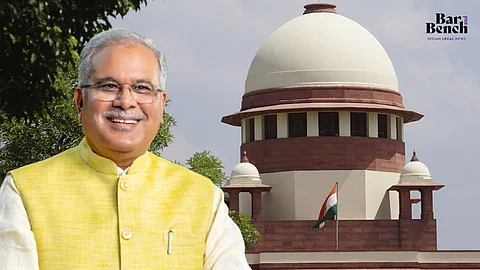
- Latest Legal News
- News
- Dealstreet
- Viewpoint
- Columns
- Interviews
- Law School
- Legal Jobs
- हिंदी
- ಕನ್ನಡ

The Supreme Court on Monday refused to entertain former Chhattisgarh Chief Minister and Congress leader Bhupesh Baghel's petition challenging the Enforcement Directorate (ED)'s powers under Section 44 of the Prevention of Money Laundering Act (PMLA) to carry out further investigation in money laundering cases based on subsequent complaints filed after the original complaint [Bhupesh Kumar Baghel v. Union Of India And Ors].
A Bench of Justices Surya Kant and Joymalya Bagchi observed that there is nothing wrong in the provision but if it is being misused, the aggrieved can approach the High Court.
"The devil is not in the law but in the abuse," Justice Bagchi remarked.
On similar lines, Justice Kant said,
"There is nothing wrong in the provision. If it is being abused, then go to the High Court."
In his plea, Baghel sought reading down of Section 44 of PMLA. He asked the Court to declare that ED officers should have the power to conduct "further investigation" after the filing of an original complaint only in exceptional circumstances and with prior permission of a jurisdictional court and upon compliance with proper safeguards.
ED is probing money laundering allegations in connection with an alleged ₹2,000 crore liquor syndicate racket in Chhattisgarh during Baghel's chief ministership. The ED has claimed that this syndicate collected illegal commissions and sold unaccounted liquor through government liquor shops.
During the hearing of Baghel's plea today, Senior Advocate Kapil Sibal submitted that the ED files supplementary complaints in PMLA cases every few months, leading to delay in trial.
However, Justice Kant remarked that further investigation may be beneficial to accused also.
"Your case is that a provision is being misused. The object of the power is not to be construed in this way. If the power is strictly exercised according to the provisions, it can be to the benefit of the accused too," the top court judge said.
Justice Bagchi observed that investigation is done with respect to an offence and truth is its only pursuit.
"Investigation is never qua an accused but an offence. Accused is incidental to the investigation. Investigation has nothing to do with filing police reports or not filing a report with respect to an individual. Truth is the only pursuit of an investigator and ultimately a judge. And in this voyage there cannot be an embargo," he said.
Justice Bagchi also said the ED is required to take prior permission of the special PMLA court for further investigation. However, Sibal said the agency does not do that. At this, the Court said,
"Therefore, that is the problem. Not the provision itself."
Ultimately, the Court disposed of the plea with the liberty to Baghel to approach the High Court. It also noted that the top court in Vijay Madanlal Chaudhary case has held that further evidence can be brought on record with the prior permission of the court.
"If ED has acted contrary to these proceedings, the accused person can always approach the high court," the Court added.